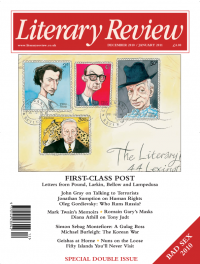Richard Overy
War of Nutrition
The Taste of War: World War Two and the Battle for Food
By Lizzie Collingham
Allen Lane/The Penguin Press 634pp £30
Every now and again a book comes along that transforms our understanding of a subject that had previously seemed so well worn and familiar. That is the measure of Lizzie Collingham’s achievement in this outstanding global account of the role played by food (and its absence) during the Second World War. It will now be impossible to think of the war in the old way. Collingham has added a whole new layer of understanding not only about the way the war was fought but about the gruelling consequences for tens of millions of non-combatants worldwide when the food chain collapsed.
Collingham begins by placing the issue of food in the larger context of the global food economy as it emerged from the nineteenth century. Industrialisation allowed food to be imported by richer states in return for industrial products, but for most major economies there remained a high level

Sign Up to our newsletter
Receive free articles, highlights from the archive, news, details of prizes, and much more.@Lit_Review
Follow Literary Review on Twitter
Twitter Feed
Russia’s recent efforts to destabilise the Baltic states have increased enthusiasm for the EU in these places. With Euroscepticism growing in countries like France and Germany, @owenmatth wonders whether Europe’s salvation will come from its periphery.
Owen Matthews - Sea of Troubles
Owen Matthews: Sea of Troubles - Baltic: The Future of Europe by Oliver Moody
literaryreview.co.uk
Many laptop workers will find Vincenzo Latronico’s PERFECTION sends shivers of uncomfortable recognition down their spine. I wrote about why for @Lit_Review
https://literaryreview.co.uk/hashtag-living
An insightful review by @DanielB89913888 of In Covid’s Wake (Macedo & Lee, @PrincetonUPress).
Paraphrasing: left-leaning authors critique the Covid response using right-wing arguments. A fascinating read.
via @Lit_Review